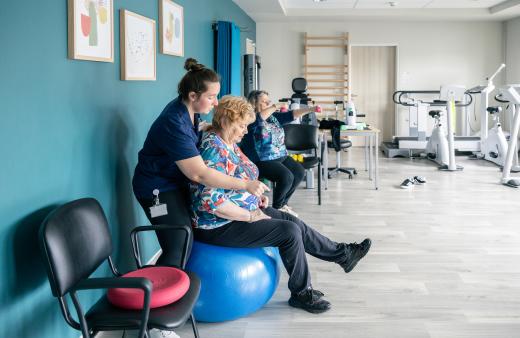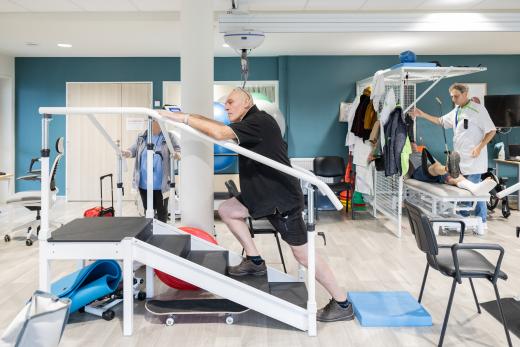Moving for a better life: adapted physical activity at the heart of mental health care

At the French National Mental Health Forum last April, a round table brought together caregivers, researchers and top athletes to discuss a topic that is still largely unexplored: the benefits of adapted physical activity (APA) in the treatment of mental disorders. Coordinated by Dr. Jérôme Patzelo, psychiatrist and world pull-ups champion, the discussion highlighted a widely shared observation: being active is also a form of self-care. Far from being a simple add-on, APA is now establishing itself as a therapeutic lever in its own right, provided it is supervised, personalised and part of a comprehensive care pathway. Contrary to a strictly medication-based approach, these experts advocated a global, humane and accessible approach to mental health.
Putting the body back at the heart of mental health care
Drug-free therapy with proven effects
The benefits of adapted physical activity on mental health are now well established. It works on several levels:
Biologically, it promotes neuroplasticity, reduces inflammation and stimulates the production of dopamine and serotonin – key neurotransmitters for mood regulation.
On the psychosocial level, it helps to boost self-esteem, increase belief in one's own capabilities and improve social interactions, all of which are essential for overcoming isolation and regaining mental balance.
Considered a ‘natural antidepressant’, APA is emerging as a comprehensive therapeutic approach without the side effects of medication.
Powerful testimonials illustrated these effects:
- Géraldine Philippe, a psychotherapist, runs boxing therapy workshops where patients relearn how to inhabit their bodies.
- Rugby player Raphaël Poulin is campaigning to break the taboo surrounding mental health in high-level sport with his association Néo Héros.
- Claire Prévaud, a hospital manager, spoke about the positive impact of mobility games and adapted physical activity units in psychiatry departments.
A form of treatment in its own right, yet still under-prescribed
While the benefits of adapted physical activity (APA) are now widely recognised, it is still under-prescribed in mental health care pathways.
During the round table, Nelly Héraud, Scientific and Research Director of the Group, pointed out that this practice still faces persistent barriers, both among professionals and patients: preconceived ideas, fear of increased fatigue, fear of incompatibility with certain disorders, etc. These perceptions are hindering its widespread adoption, despite growing recognition of its effectiveness.
However, its effects are all the more powerful when it is personalised and supervised by trained professionals. When integrated into a coordinated care pathway – with an initial assessment, regular support and collaboration between caregivers and APA experts – it becomes a real lever for care, prevention and overall remobilisation.
A dynamic already underway at Clariane
As part of our Positive Care approach, Clariane is committed to offering comprehensive care that goes beyond medication alone.
In Inicea SMR clinics, the integration of APA into the medical project is a key focus. The aim is to offer each patient an assessment of their abilities, a personalised programme supervised by a multidisciplinary team, and regular monitoring to adjust their care. This approach is gradually being implemented across the Group's facilities.
Adapted physical activity thus becomes a tool for care, prevention, and overall remobilisation.

Making APA a permanent part of tomorrow's healthcare practices
Adapted physical activity should no longer be seen as a ‘bonus’ but as an integral part of mental health care. This requires strengthening training, prescribing practices and bridges between caregivers, sports educators and local organisations.
As a committed healthcare provider, Clariane wishes to contribute to this dynamic by supporting innovative projects, promoting non-pharmacological interventions and promoting a holistic approach to care. By building on existing mechanisms – such as French sports health centres (Maisons Sport-Santé) – and developing long-term partnerships, Clariane is demonstrating its commitment to a more humane, comprehensive and forward-looking approach to mental health.
Adapted Physical Activity, regulatory definition: ‘Adapted physical activity refers to physical movements produced by skeletal muscles in a context of daily activity, leisure, sport or planned exercise, based on the abilities and motivations of individuals with specific needs that prevent them from participating in ordinary conditions. It is supervised by qualified professionals.’
Physical activity (WHO): any bodily movement produced by skeletal muscles that requires energy expenditure. Physical activity refers to all movement including during leisure time, for transport to get to and from places, or as part of a person’s work or domestic activities. Both moderate- and vigorous-intensity physical activity improve health.

